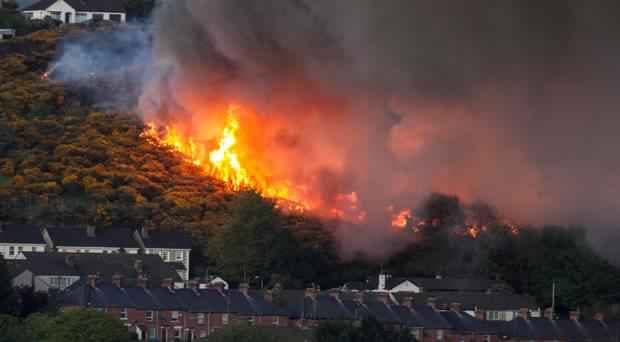
Firefighters battled more than 500 deliberate gorse fires in a single week last year – the majority in the Southern Area.
And as the warmer weather arrives, Northern Ireland Fire and Rescue Service is warning of the dangers and serious consequences and appealing for people to act responsibly
The last financial year saw NIFRS attend 2,072 gorse fires across Northern Ireland, representing a 27% increase from the previous year.
Between May 1 and 8 last year, firefighters tacked 511 gorse fires of which 466 were started deliberately.
The majority of these incidents – 407 – occurred in either the Southern (245) or Western (162) Area Commands.
NIFRS is reminding everyone that dealing with these types of incidents not only puts firefighters’ lives at risk but also the lives of everyone in the local community and puts additional pressure on operational resources.
Mark Smyth, Group Commander and NIFRS Lead Officer for Wildfires explains: “Deliberate fire setting in the countryside is still very much a significant issue for Northern Ireland.
“The current spell of dry, sunny weather is providing a tinderbox landscape with conditions ripe for gorse fires to take hold. We have already dealt with the first gorse fires of the year in the last number of weeks so we are appealing to the public, and young people in particular, to help us by acting responsibly.
“Tackling gorse and wildland fires is extremely challenging for us. It means deploying firefighters and equipment to remote locations.
“This can be for a prolonged period of time with our Crews working under hazardous and intense heat to bring the fires under control. These fires can easily spread and even a slight change in wind direction can pose a serious risk to life, property and the environment.
“It’s not just the larger fires on hillsides and mountains that impact upon resources, the smaller fires involving grass and bushes also need to be dealt with quickly as they have the potential to spread and develop into bigger fires.
“Attending such incidents puts additional pressure on our people and our resources.
“Alongside partner agencies and community groups, we have been working hard to address the problem of gorse fires and educate people about the dangers and consequences of deliberate fire setting – the reduction in the number of gorse fires we have attended is testament to this work.
While the majority of gorse fires attended by NIFRS are started deliberately they can also be start unintentionally by thoughtless and careless behaviour.
Both deliberate and accidental fires can cost lives and NIFRS is asking that the public heed fire safety advice to protect themselves and the countryside.
* Extinguish cigarettes and other smoking materials properly.
* Never throw cigarette ends out of car windows.
* Only use barbecues in designated and safe areas and never leave them unattended. Keep children and ball games away from barbecues.
* Ensure that barbecues are fully extinguished and cold before disposing of their contents.
* Avoid using open fires in the countryside.
* Do not leave bottles or glass in woodlands. Sunlight shining through glass can start a fire. Take them home or put them in a waste or recycling bin.
* If you see a fire in the countryside, report it immediately to the Fire & Rescue Service. Don’t attempt to tackle fires that will take more than a bucket of water to put out. Leave the area as soon as possible.
* Report any suspicious behaviour to the police.





